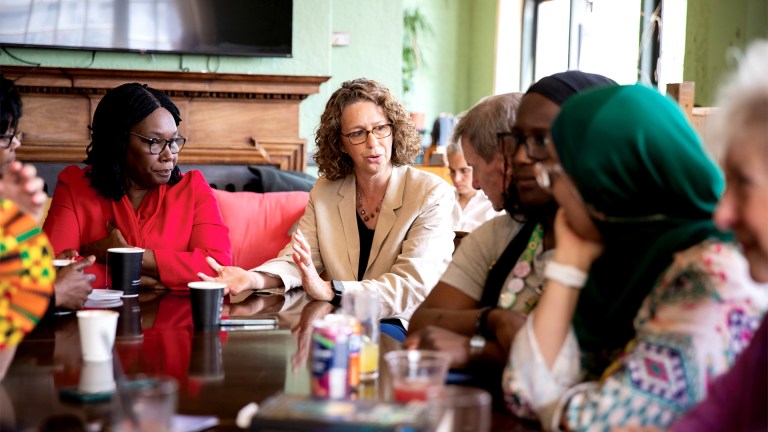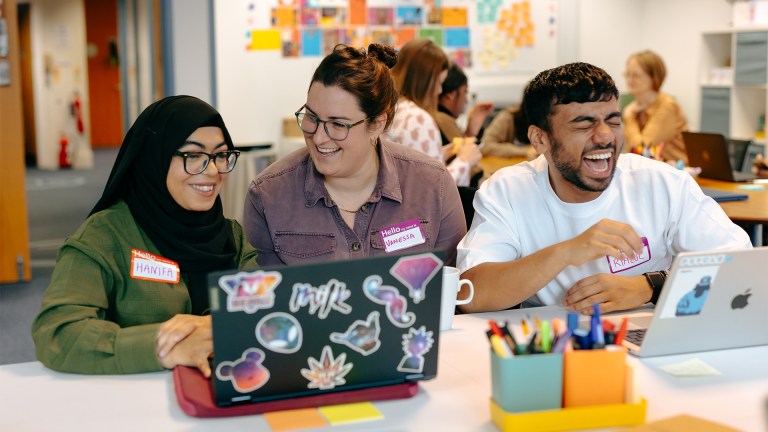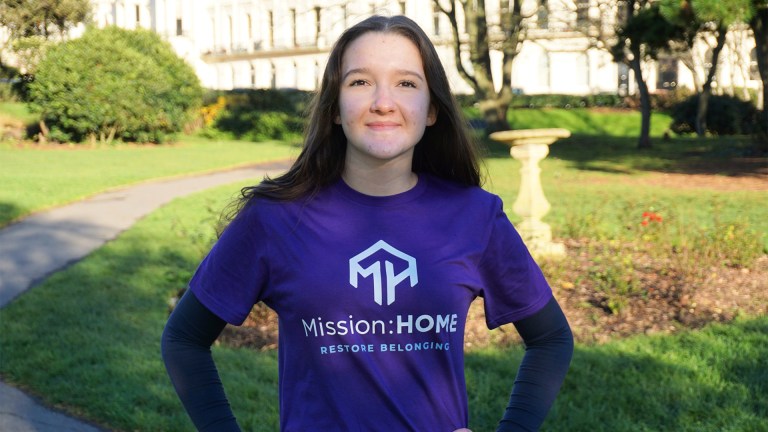In January last year, she, Kate and her older daughter Becky set up Hey Girls – a social enterprise producing sanitary protection on a buy-one-give-one model; in other words, for every product sold Hey Girls donates another to a local organisation such as a foodbank, women’s refuge, YWCA, Girl Guide group or breakfast club.
“A lot of campaigns around period poverty have cheaper products to give away, but that’s like telling girls: ‘This is what you are worth’. With us, what you buy in the supermarkets is exactly what we donate. Periods are periods. They are the same for everyone. Just because you can’t afford it right now doesn’t mean you shouldn’t have lovely products to help manage them.”
With the help of Big Issue Invest’s Power Up Scotland initiative, which lends money to early-stage social ventures, Hodson’s business has grown rapidly. Hey Girls products are now on the shelves of 290 Waitrose and 230 Asda stores across the UK and the company has the contract to supply sanitary protection to schools in 26 of Scotland’s 32 local authority areas.
A further loan helped the organisation achieve its latest success. Their products are now being sold in 184 Co-op stores across the UK. On both occasions, the money has allowed Hey Girls to upscale and buy enough stock to fulfil those major contracts.
“The Co-op is hugely exciting because it’s right in the heart of communities, which is where we want to be,” Hodson says. She insists her business couldn’t have grown in the way it has without The Big Issue, which has also provided legal and financial expertise and mentoring.
Advertising helps fund Big Issue’s mission to end poverty
Hey Girls has benefited from, and fed into, an upsurge in interest in period poverty, as captured in Ken Loach’s 2016 film I, Daniel Blake. In his indictment of the system, a character called Katie, whose benefits have been frozen, is caught stealing tampons.
A 2017 survey by humanitarian organisation Plan International found one in seven girls had struggled to afford sanitary protection. Further research conducted by Hey Girls suggested it could be higher and that one in four of those affected had missed school due to their periods.
A flurry of campaigning by grassroots groups such as Women for Independence (in Scotland) along with MPs and MSPs raised awareness and put pressure on the UK government to scrap the five per cent tax paid on sanitary protection. As it’s an EU tax, progress has been slow, though some supermarkets have absorbed the cost themselves. Hodson however sees this as a redherring. “If you can’t afford £1, then you can’t afford 95p,” she reasons.
Last year, the Scottish Government set up a £5.2m fund to allow sanitary pads and tampons to be given out free at schools, colleges and universities, and Westminster is in the process of introducing a similar policy in England.
In the early days, the only products Hey Girls produced were biodegradable sanitary towels made of bamboo and corn fibre. The range has since expanded to include non-applicator tampons, menstrual cups and most recently, tampons with compostable sugar cane applicators.
So far, 2.4 million free products havebeen distributed through more than 200partner organisations.
Advertising helps fund Big Issue’s mission to end poverty
But Hey Girls is also focused on education. It runs workshops in schools, youth groups and women’s groups and has developed a lesson plan that can be downloaded by schools. A separate campaign to encourage dads to talk to their daughters about menstruation was fronted by actor Michael Sheen. “Nowadays you have single dads bringing up children or you might have mum out at work and dad looking after the daughter when she starts her period. Is he ready to have that chat? We offer support to make sure everybody has a clear understanding of what’s involved.”
And the Give a Cup a Go! campaign was a UK-wide series of awareness-raising ‘parties’ teaching women and girls how to use menstrual cups and giving them one to take home with them.
Hodson’s goal is ambitious: the eradication of period poverty. It sounds like a tall order, but in its short existence Hey Girls has already improved the lives of thousands of women and girls, boosting their confidence. “Helping girls be the best that they can be is important to us,” Hodson says. “Just knowing you are able to manage your period when you haven’t in the past is a hugely empowering thing.”
Power Up Scotland: a brand new approach
Across the UK, Big Issue Invest tailors support to newer social enterprises through a unique programme.
Power Up Scotland supports early-stage social enterprises that need business support and may be looking at taking on social investment for the first time. The programme is run in partnership with Aberdeen Standard Investments, The University of Edinburgh, Places for People, Experian, Brodies LLP and the Scottish Government. Through this public, private and third-sector partnership, organisations are provided access to networks, business mentoring and investment of up to £50,000.
Applications are now open. For more information get in touch: Scotland@bigissueinvest.com
Advertising helps fund Big Issue’s mission to end poverty









